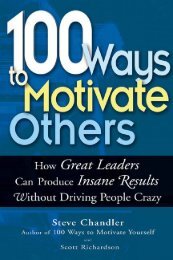Presentation-Secrets-Of-Steve-Jobs
You also want an ePaper? Increase the reach of your titles
YUMPU automatically turns print PDFs into web optimized ePapers that Google loves.
MAKE IT LOOK EFFORTLESS 191<br />
who seems to have ready answers to any question. You can use it<br />
to prepare for presentations, pitches, sales calls, or any other situation<br />
in which you anticipate difficult or sensitive questions.<br />
1. Identify the most common questions likely to be raised.<br />
Clinton expected a question about her husband’s international<br />
foundation and its list of donors. Critics had widely<br />
publicized the issue, saying her appointment would be a<br />
conflict of interest. She also knew that each of the world’s<br />
hot spots at the time would be fair game: Gaza, Iran, Iraq,<br />
Pakistan, and others. For the car executives, the most<br />
common question would be along the lines, “How do you<br />
expect to sell cars in this economy?” Or, “Will 2009 only get<br />
worse for the auto industry?”<br />
2. Place the questions into “buckets,” or categories. There might<br />
be only one question in a bucket, as in the case of the Clinton<br />
Foundation, or there might be several, as in the case of the<br />
carmakers and the economy. The point is to reduce the number<br />
of questions for which you must prepare. It’s uncanny, but<br />
in my experience training thousands of speakers, the majority<br />
of questions will fall into about seven categories.<br />
3. Create the best answer you have for the category. And this<br />
is critical—the answer must make sense regardless of how<br />
the question is phrased. You must avoid getting pulled into<br />
a detailed discussion based on the wording of the question.<br />
For example, here is Clinton’s answer about her husband’s<br />
fund-raising efforts: “I am very proud to be the presidentelect’s<br />
nominee for secretary of state, and I am very proud<br />
of what my husband and the Clinton Foundation and the<br />
associated efforts he’s undertaken have accomplished, as<br />
well.” 12 She would have said exactly the same thing regardless<br />
of how pointed the question from Republican senators<br />
was.<br />
4. Listen carefully to the question, and identify a key word—a<br />
trigger—that will help you isolate the correct bucket from<br />
which to pull to your answer.<br />
5. Look the person in the eye and respond with confidence.


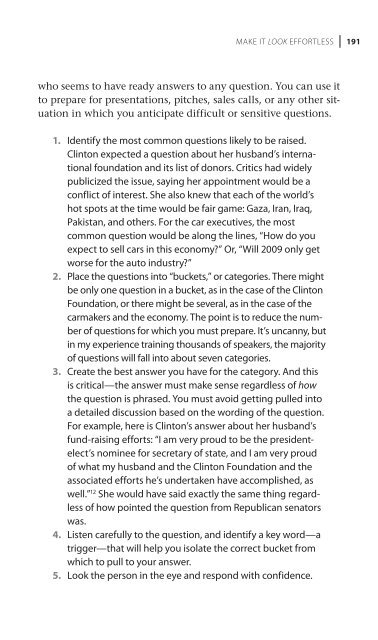

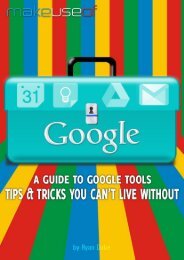

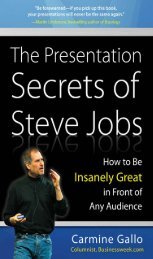




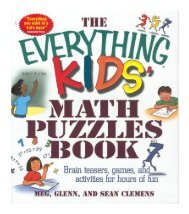


![[Lonely Planet] Sri Lanka](https://img.yumpu.com/59845622/1/169x260/lonely-planet-sri-lanka.jpg?quality=85)
